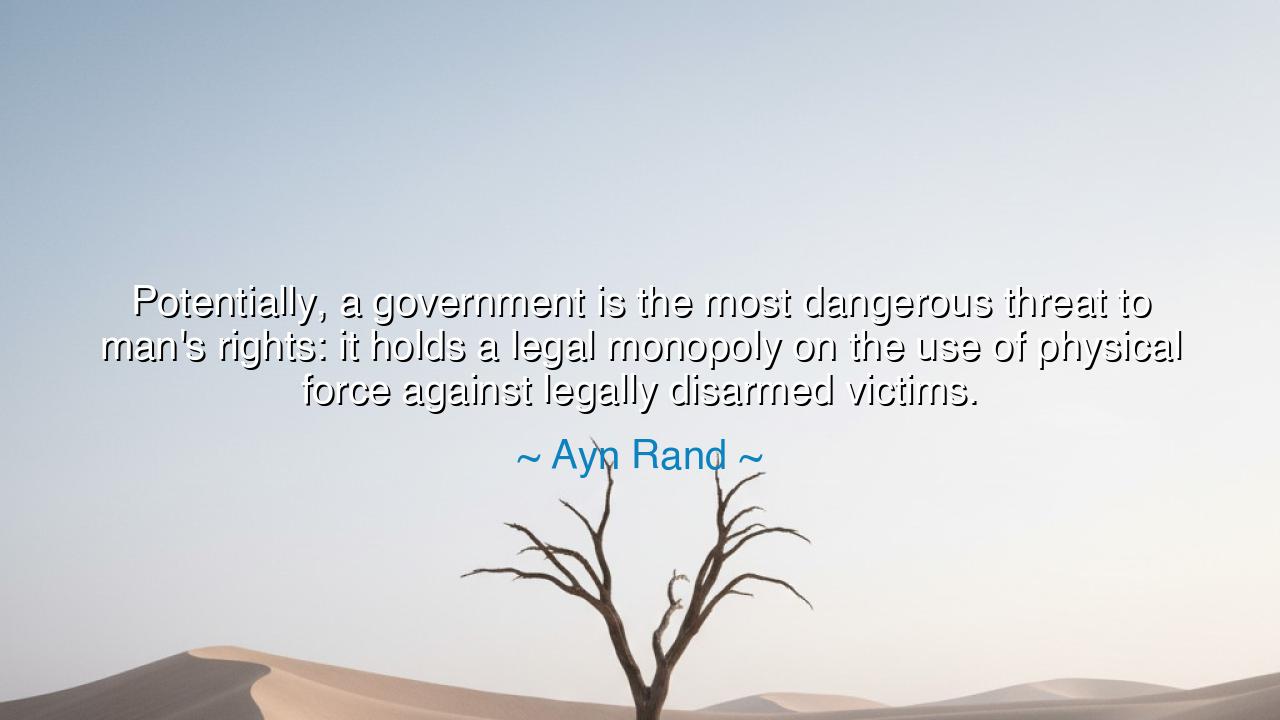
Potentially, a government is the most dangerous threat to man's
Potentially, a government is the most dangerous threat to man's rights: it holds a legal monopoly on the use of physical force against legally disarmed victims.






The words of Ayn Rand — “Potentially, a government is the most dangerous threat to man’s rights: it holds a legal monopoly on the use of physical force against legally disarmed victims.” — thunder with the authority of warning and the sorrow of experience. In them lies a truth that has echoed through every age of civilization: that power, even when born from the will of the people, bears within it the seed of tyranny. Rand, a philosopher who fled from the oppression of Soviet Russia, wrote these words as both a survivor and a sentinel — one who had seen with her own eyes how noble dreams of equality could harden into chains of control. Her message is not one of rebellion against all rule, but a cry for eternal vigilance — that freedom once surrendered to unchecked power may never be regained.
The origin of this quote rests in Rand’s philosophy of Objectivism, which holds that the highest moral purpose of life is the pursuit of one’s own rational happiness and that government exists only to protect the individual’s natural rights — life, liberty, and property. Having witnessed the horrors of a regime that enslaved the human mind and justified it as the “greater good,” Rand understood that government, if not bound by moral limits, becomes the very enemy it was created to restrain. She called it “potentially” the most dangerous threat because its authority is not merely physical, but lawful — sanctioned by legitimacy, cloaked in duty, and carried out in the name of justice. It does not strike from the shadows like a thief or a tyrant in exile; it strikes from the throne, claiming virtue as its weapon.
To say that government holds a “legal monopoly on the use of physical force” is to remind us of its unique and perilous nature. No other entity in society may compel, imprison, or kill with lawful justification. The farmer, the merchant, the philosopher — none may take another’s liberty or life without facing punishment. Yet government alone may do so “in the name of order.” This is a power that can be both a blessing and a curse. When guided by justice, it is the shield that guards civilization; when guided by corruption, it becomes the sword that slays the innocent. It is this duality of power that Rand sought to unveil — that the very hand that protects the people can, if left unbound, enslave them.
History bears grim testimony to her warning. In the twentieth century, nations that once stood as pillars of progress fell into the abyss of despotism. Nazi Germany rose not through anarchy, but through laws — laws written, ratified, and enforced by the machinery of the state. Citizens who cherished order more than liberty surrendered their weapons and their voices, believing themselves secure under the promise of protection. Yet that same protection became the cage of their destruction. The people were “legally disarmed victims,” powerless before the totalitarian will that claimed their rights, their dignity, and their lives. Thus, the greatest crimes of history were not committed in defiance of law, but under its sanction.
Rand’s insight, therefore, is not merely political — it is moral. She reminds us that the purpose of government is not to rule over men, but to serve them by defending their rights. The moment government forgets this purpose and claims the power to decide what those rights are, it transforms from guardian to oppressor. The monopoly on force must be chained by reason, by law, and by the vigilant eyes of the people. To tolerate government power without accountability is to invite enslavement by consent. To preserve liberty, one must ensure that the sword of justice never turns inward against those it was sworn to defend.
The lesson here is profound and enduring: freedom cannot exist without restraint — not the restraint of the people by government, but the restraint of government by the people. Citizens must never surrender their ability to question, to criticize, and, when necessary, to resist encroachment upon their natural rights. The right to self-defense, both moral and civil, is not a relic of rebellion but a cornerstone of dignity. For when the individual is stripped of all power to protect himself — when he is disarmed in body, mind, and spirit — he becomes the subject of the state, not its sovereign.
Therefore, let Rand’s warning be carried as both wisdom and weapon: guard the gates of freedom with vigilance, and do not mistake comfort for safety. A government unrestrained by principle will always grow — feeding on fear, justifying intrusion as compassion, and trading liberty for illusion. Freedom is not inherited; it is maintained. Let every citizen remember that the power of the state flows from their consent, not their surrender. For only when government remains the servant of rights, and never their master, can humanity walk upright, unbroken, and free beneath the sun.






AAdministratorAdministrator
Welcome, honored guests. Please leave a comment, we will respond soon